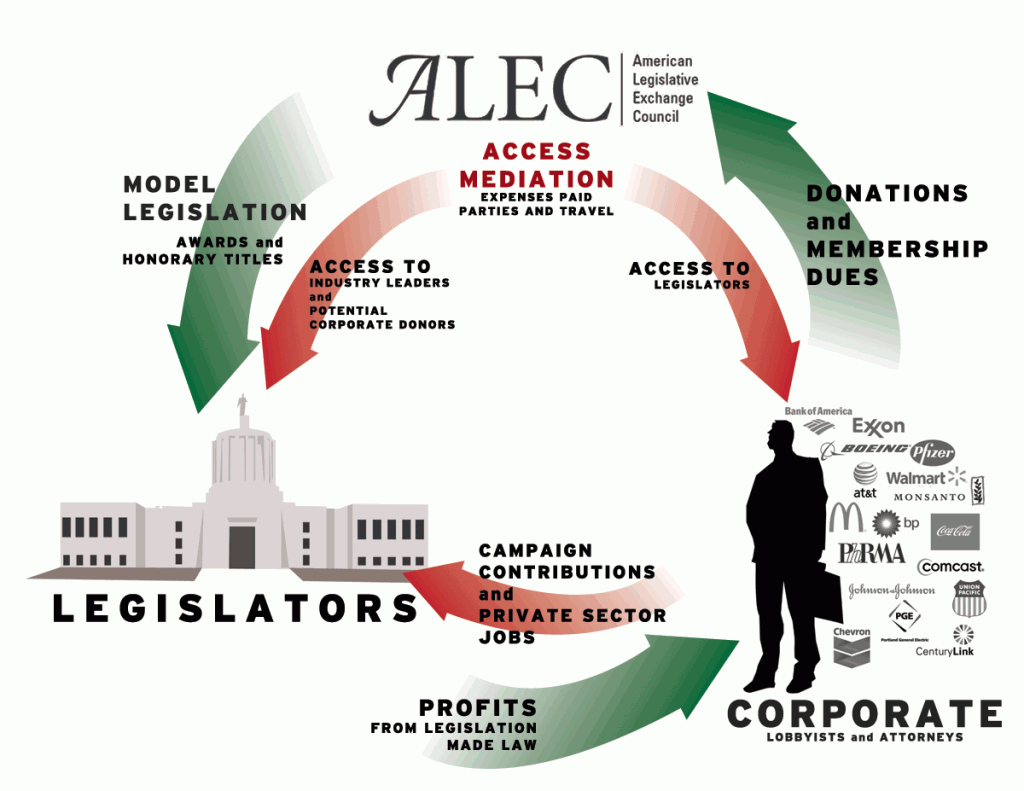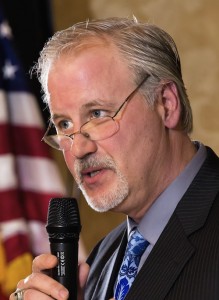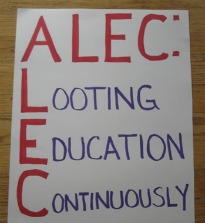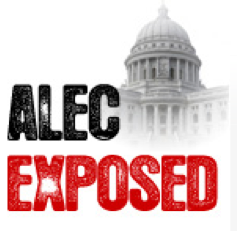 ALEC is back in Rhode Island. Republican legislator Pat Morgan confirmed she’s a member of the American Legislative Exchange Committee, a business-backed bill mill that pairs corporate donors with state legislators.
ALEC is back in Rhode Island. Republican legislator Pat Morgan confirmed she’s a member of the American Legislative Exchange Committee, a business-backed bill mill that pairs corporate donors with state legislators.
“I found it to be a really good group,” she told RI Future.
ALEC’s website lists Morgan as the state director in Rhode Island. Her 2016 financial disclosure form shows two trips to ALEC conferences – to San Diego, for $1,400 and to Phoenix for $1,100.  ALEC membership in Rhode Island was a hot button issue in 2012, when the group’s model Stand Your Ground bill became controversial after it helped exonerate George Zimmerman in the killing of Trayvon Martin. That year 24 local legislators, half of whom were Democrats, were members. By 2013, there were only six ALEC members in the General Assembly (though on p. 39 ALEC lists 12 members in 2013). In February 2015, RI Future reported that the last legislative membership in ALEC had expired on the last day of 2014. Morgan said she has been an ALEC member since January of 2015, but she was unsure of the exact month.
ALEC membership in Rhode Island was a hot button issue in 2012, when the group’s model Stand Your Ground bill became controversial after it helped exonerate George Zimmerman in the killing of Trayvon Martin. That year 24 local legislators, half of whom were Democrats, were members. By 2013, there were only six ALEC members in the General Assembly (though on p. 39 ALEC lists 12 members in 2013). In February 2015, RI Future reported that the last legislative membership in ALEC had expired on the last day of 2014. Morgan said she has been an ALEC member since January of 2015, but she was unsure of the exact month.
Morgan said she does not know anything about ALEC’s involvement with Stand Your Ground laws, and did not know the group had been controversial in Rhode Island.
She also said she does not where ALEC’s funding comes from. When informed it comes from corporations, she said, “I’m just as much against corporate welfare as you are. My idea is to do what’s right for Rhode Islanders, not for corporations.”
Her campaign opponent, independent Vincent Marzulo, is raising Morgan’s involvement in ALEC as a reason to vote against her. (Democrat Anthony Paolino is also running against Morgan).
“Her advocacy for private profit at the public’s expense raises serious questions concerning her commitment to the public good,” said Marzulo. “The American Legislative Exchange Council (ALEC) is a secretive, right-wing, Koch Brothers-funded corporate advocacy group that seeks private profit at the expense of public interest.”
Sam Bell, state director of the Rhode Island Progressive Democrats, added, “A far-right group that takes uses a money hose of corporate money to influence state politics, ALEC has wreaked great damage all across our country. From stand your ground laws and voter ID to an ocean of bills to help corporate special interests, ALEC has been uniquely effective at pushing awful public policy on the American people. It is hardly surprising that ALEC would align itself with Pat Morgan, a Wall Street politician known for supporting nutty right wing policies. For instance, Pat Morgan actually signed onto a bill to privatize roads and put tolls on cars.”
Morgan said doesn’t think of ALEC as being “conservative or liberal”. She said her relationship with ALEC has already paid dividends for Rhode Island. She said at a conference she learned about the drug Vivitrol, used to help people ween off drug addiction. She said the product is now used at the Adult Correctional Institute, in part because of her.
She said she doesn’t agree with everything ALEC pushes – citing a “session on international relationships.” She said she did not remember the specifics of the session. She also said there was an ALEC session on legalizing marijuana, an issue she said she does not agree with.
When asked if she thinks ALEC cares more about its corporate sponsors or her constituents, Morgan said, “I believe they care more about good policy that helps average people lead good lives.”
17 minutes into our interview, Morgan asked if she was on or off the record. I told her I identified myself as the editor of RI Future when I first called. Morgan feels I should have also informed her that I was writing a story. She hung up on me, and called back a few minutes later yelling. She said she does not think I have integrity.
House spokesman Larry Berman said the legislature does not pay dues of any ALEC legislators, as was the practice in 2012.
]]> From the headlines, you would think that CNBC is the gold standard economic authority. After the cable news network released its 10th annual “America’s Top States for Business 2016” listing, in which Rhode Island was ranked dead last, local corporate media raced to bring the bad news to readers and viewers. CNBC ranks R.I. worst state for business, CNBC: Rhode Island ranked ‘Bottom State for Business‘, and RI back to dead last in new CNBC rankings are typical examples from the Projo, Channel 10 and Channel 12 respectively.
From the headlines, you would think that CNBC is the gold standard economic authority. After the cable news network released its 10th annual “America’s Top States for Business 2016” listing, in which Rhode Island was ranked dead last, local corporate media raced to bring the bad news to readers and viewers. CNBC ranks R.I. worst state for business, CNBC: Rhode Island ranked ‘Bottom State for Business‘, and RI back to dead last in new CNBC rankings are typical examples from the Projo, Channel 10 and Channel 12 respectively.
Missing from the Cassandra-like coverage is any hint that the rankings are meaningless and based on metrics that rate our state on how well our policies kowtow to the whims of business, not on how well they benefit the poor and middle class. Only Ted Nesi even approaches this angle in his coverage, but he did so through the lens of competing political discourse. But what about the economics of the report? Does it hold up under scrutiny? I’ve tackled the subject of economic rankings before, here and here, trying to bring some sort of real economic analysis to bear.
I asked Doctor of Economics Douglas Hall, Director of Economic and Fiscal Policy at the Economic Progress Institute, for some insights. Hall said that many of CNBC’s economic indicators “have a lot of merit and point to the need to address matters via public policy, such as repairing the state’s crumbling infrastructure and the need to help Rhode Islanders improve their educational attainment. But when you deconstruct their aggregate groupings,” said Hall, “many of the categories are deeply flawed and point to policies that would severely undermine the well-being and quality of life of working families in Rhode Island.”
One indicator the report uses is “union membership and the states’ right to work laws.” Low union membership and strong anti-union right to work laws contribute to a higher economic ranking for a state in CNBC’s report, yet Hall says that “research clearly shows that as unionization rates have gone down, the well-being of the American middle class has gone down.” In Hall’s view, this metric “taints the entire aggregate measure.”
Another metric, the CNBC aggregate category for the cost of doing business, considers the cost of paying wages and presumably, says Hall, “a state in which every employee worked for sub-poverty wages would get a very high grade in this category, while those paying living wages that can sustain a family and support a viable business community through demand for goods and services, would get a low grade in this category.”
It seems clear that these rankings of states by various business interests, including corporate entities such as CNBC, puppet organizations such as ALEC and members of the State Policy Network (which includes the RI Center for Freedom and Prosperity) and various Chambers of Commerce are are not objective measures of a state’s economic well-being, but are tools crafted to shape public policy to the advantage of large business interests and to the detriment of the poor and middle class.
The most sensible tactic in dealing with such garbage is to file it accordingly.
]]> At the 2016 Rhode Island Small Business Economic Summit (Summit), Grafton H. “Cap” Wiley IV told Governor Gina Raimondo, House Speaker Nicholas Mattiello and a room full of government officials and small business owners that “it would be great if we had enough revenue to get rid of the estate tax” or if we don’t have enough revenue, “look at an increase in the exemption.”
At the 2016 Rhode Island Small Business Economic Summit (Summit), Grafton H. “Cap” Wiley IV told Governor Gina Raimondo, House Speaker Nicholas Mattiello and a room full of government officials and small business owners that “it would be great if we had enough revenue to get rid of the estate tax” or if we don’t have enough revenue, “look at an increase in the exemption.”
“That’s something I’ve got my eye on,” said Mattiello, offering to collaborate with the business community to do something about it.
The idea of reforming the estate tax came out of a previous Summit, said Wiley, and the important thing, he continued, looking towards Raimondo and Mattiello, is that, “you guys are listening.”
“Rhode Island ends up at the bottom of a lot of the ratings of taxes and business climate,” said Wiley, and though he did not specify to what ratings he was referring, two annual business climate rankings, the SBEC (Small Business and Entrepreneurship Council)’s Small Business Policy Index and ALEC (American Legislative Exchange Council)’s Rich States, Poor States, include the mere existence of a state level estate tax as a negative in their questionable formulas for determining a state’s ranking.
The problem, says economist Peter Fisher, is that “the estate tax – which is paid only by the ultra-wealthy – doesn’t affect economic growth.”
Fisher says that Rich States, Poor States author Arthur Laffer, “and his co-authors devote an entire chapter to estate and inheritance taxes, incorrectly tagging them as ‘job killers’ that ‘strangle economic growth.’”
Laffer and company assert that states with an estate tax are losing ‘enormous amounts of accumulated wealth,’ and that this wealth would have created jobs, alleviated poverty, and increased tax revenue, but they fail to explain how this would happen. The wealth held by retirees typically is not the kind of capital normally used in job creation. The wealth that drives prosperity consists of real assets: natural resources, plant and equipment, public infrastructure, human capital, technological knowledge. By contrast, large estates typically consist of real estate, stocks and bonds, mutual funds, and other financial assets which could be located anywhere in the world. The future use of those assets is unaffected by where the person who owned them died.”
 So why would Mattiello be so eager to look at an idea that amounts to both failed tax policy and a giveaway to the mega rich? As Bob Plain showed, the last time RI messed with the estate tax, the burden of public services and infrastructure was shifted onto poor and middle class Rhode Islanders, allowing the rich and the mega rich to become richer still. These policies contribute to our ever increasing wealth inequality and pervert our democracy, tilting us ever faster towards an oligarchy represented by the likes of “Cap” Wiley, if we aren’t there already.
So why would Mattiello be so eager to look at an idea that amounts to both failed tax policy and a giveaway to the mega rich? As Bob Plain showed, the last time RI messed with the estate tax, the burden of public services and infrastructure was shifted onto poor and middle class Rhode Islanders, allowing the rich and the mega rich to become richer still. These policies contribute to our ever increasing wealth inequality and pervert our democracy, tilting us ever faster towards an oligarchy represented by the likes of “Cap” Wiley, if we aren’t there already.
Citing an Economic Progress Institute (EPI) fact sheet, Plain wrote, “The clear winners are a small number of wealthy taxpayers whose estates will pay less in taxes and in many cases, nothing at all starting next year. The clear losers are tens of thousands of low- and modest-income Rhode Islanders who will pay more in taxes next year. Unemployed homeowners and renters are among the biggest losers, because they will no longer qualify for property tax assistance and are not eligible for the earned income tax credit (EITC). Many of the lowest-wage workers will also be negatively impacted by the loss of the property tax refund, even with an eventual boost in the EITC.”
“SBEC’s stated mission, says Fisher, “is to ‘encourage entrepreneurship and small business growth,'” but “its lobbying activities reveal a very conservative, anti-government agenda.” ALEC, “is a mechanism by which corporations pay substantial sums of money to draft legislation benefiting them.” Neither group has the interests of state economies or average citizens in mind when they advance their agendas under the guise of “economic research.” These groups are made up entirely of the oligarchic prosperous and their servile, deluded sycophants.
Our gullible state leaders are not searching for real economic solutions to our state’s budgeting issues, they are instead looking for the excuses they need to pass the legislation their corporate masters demand.
To truly help our economy and budget, instead of eliminating the estate tax we should be increasing it.
Also, do yourself a favor and familiarize yourself with Peter Fisher’s website:
]]> Before the ink was dry on the highlights of the conference Transforming and Democratizing Public Education: An Activist Summit, Rhode Islanders concerned about the survival of public education were confronted with a threat from the General Assembly.
Before the ink was dry on the highlights of the conference Transforming and Democratizing Public Education: An Activist Summit, Rhode Islanders concerned about the survival of public education were confronted with a threat from the General Assembly.
Senate bill 607, benignly titled THE BRIGHT TODAY SCHOLARSHIP AND OPEN ENROLLMENT EDUCATION ACT, was heard in the Senate Education Committee on May 20, and the companion bill (H 5790) was heard in the House Finance Committee on May 27. This egregious bill would provide state education tax dollars to any family in Rhode Island that believes their child would benefit from any other school than the one designated by their residence—any other public school in or out of their district, a private school, religious school, online virtual school, or home school. The scholarship that the family could obtain would have a cap of $6,000 (except for special needs students), but would be awarded according to a sliding scale of family income.
All families deserve fully funded and resourced neighborhood public schools with well-prepared and experienced teachers who make teaching their career. Families who choose to do so certainly have the option to send their children to private schools, religious schools, or to home school their children. But the overwhelming number of children attend public schools. Public schooling, though beset with many problems, is the foundation of a just and civil society. Public schools are overseen by local school boards, whose actions and decisions are accountable to the public. It is antithetical to our shared values to have public money siphoned off to private schools, particularly if the schools are religious in nature. Providing “scholarships” for students to attend non-public schools will wreak havoc on the public system, particularly at a time when public schools are already under assault from the neoliberal, free-market approach to schooling, with the expansion of charter schools, incessant standardized testing, and evaluating and sanctioning students, teachers, and schools by test scores on invalid standardized tests such as the PARCC.
The bill includes “scholarships” for students to participate in virtual, online schools, which have had an abysmal record in other states. This bill also includes “scholarships” for students with special needs. These students are entitled to a free and appropriate PUBLIC education under the Individuals with Disabilities Education Act. Unfortunately, under-resourced public schools have not always provided the full range of supports that these students need and deserve. Sending them to private schools that likely do not have the resources to meet the plethora of diverse needs of students with learning challenges will make this situation worse.
This bill is being heavily supported and promoted by the RI Center for Freedom and Prosperity. This group has made a number of rosy claims about the bill’s benefits not only to families but also to taxpayers and to public schools. I have read some of their reports and did not see any evidence that they have been peer-reviewed or critiqued by qualified authorities. The impetus stems from the Milton Friedman ideology of free-market/privatization reforms that have been devastating to education in other countries. Further, a few minutes of Googling turns up the undeniable fact that parts of this bill have been lifted almost word for word from “model bills” from the playbook of the American Legislative Exchange Council, also known as ALEC.
For those who are unaware of ALEC, this insidious group promotes the collusion of legislators and corporate moguls to write model legislation to be stealthily introduced into state houses across the country. This goes against the most fundamental rights of Americans to live in a country of the people, by the people, and for the people. Please see this great clip from an Atlanta, GA TV station that exposes how ALEC operates:
As evidence of ALEC’s influence on the wording of this bill, please check this link. If you scroll down the list of “Bills Affecting Americans’ Rights to a Public Education,” you will see two bills that are represented in the language of the RI bills. The first is 2D16 The Parental Choice Scholarship Program Act Part 1 Exposed. The second is 2D21 The Special Needs Scholarship Program Act Exposed. The yellow highlights that you will see are in the original from ALEC Exposed, provided by the Center for Media and Democracy.
During the Senate Hearing, Senator Sheehan clearly stated the reason that I believe proves that this bill needs to die in committee: This bill is for the purpose of the privatization of public schools, he said.
]]>
Rhode Island is now an ALEC-free zone.
When the year 2014 expired on December 31, so did Warwick Senator William Walaska’s membership in the American Legislative Exchange Council, a once-controversial right-wing bill mill that partnered corporate interests with state lawmakers to draft conservative model legislation to be shopped to Statehouses across the country.
Walaska, a Democrat, was the last local legislator who was an ALEC member – and the only one to renew membership since 2012. His lapsed membership means that the Rhode Island State House will not receive any copies of ALEC’s monthly magazine.
“We do not get their literature any more since we have no members any longer,” said House spokesman Larry Berman.
ALEC had existed in the background of state politics all over the country for decades. But the Koch-aligned group became a toxic in 2012 when its model Stand Your Ground Law exonerated George Zimmerman in the killing of Trayvon Martin.

At the same time, ALEC was quietly enjoying significant influence in the Rhode Island General Assembly. Former Woonsocket Rep. Jon Brien, a Democrat and member of Speaker Gordon Fox’s leadership team, was named to ALEC’s national board of directors and more than 20 percent of the state legislature were members – at the taxpayers expense. Organized labor took issue as local legislators started quickly denouncing their affiliation. At the height of ALEC’s influence in Rhode Island, 24 local legislators, half of whom were Democrats, were members. By 2013, there were only six ALEC members in the General Assembly (though on p. 39 ALEC lists 12 members in 2013).
In June, New York Times columnist Joe Nocera said Woonsocket suffered from an ALEC mindset and in July CVS, based in Woonsocket, dropped its membership in ALEC, which at the time was the last corporate ALEC member in Rhode Island. Brien was was defeated in his bid for reelection that fall.
 Nationally ALEC membership dropped 5.6 percent from 2011 to 2013, according to internal ALEC information leaked by first released by The Guardian (p.37). Jay Riestenberg, a researcher for Common Cause, said ALEC has likely picked up some new legislators in 2014 because of a “historic number of Republican state legislators in office.”
Nationally ALEC membership dropped 5.6 percent from 2011 to 2013, according to internal ALEC information leaked by first released by The Guardian (p.37). Jay Riestenberg, a researcher for Common Cause, said ALEC has likely picked up some new legislators in 2014 because of a “historic number of Republican state legislators in office.”
Corporate sponsorship has dropped dramatically though, with more than 100 leaving since 2011 and financial support down 19 percent in 2013. But while the ALEC organism has been diminished, its DNA is still being effective, even here in Rhode Island.
 Riestenberg said some of the corporate money that has been divested from ALEC has matriculated to the State Policy Network and cited Microsoft, Facebook and Kraft as examples. The State Policy Network, or SPN, is funded by corporations and Koch-aligned special interests to push conservative ideology at the state level. PR Watch has pushed a campaign linking SPN and ALEC saying it is a right wing think tank pushing the ALEC agenda in the states.
Riestenberg said some of the corporate money that has been divested from ALEC has matriculated to the State Policy Network and cited Microsoft, Facebook and Kraft as examples. The State Policy Network, or SPN, is funded by corporations and Koch-aligned special interests to push conservative ideology at the state level. PR Watch has pushed a campaign linking SPN and ALEC saying it is a right wing think tank pushing the ALEC agenda in the states.

Riestenberg identified the Rhode Island Center for Freedom and Prosperity as the SPN affiliate in Rhode Island, as has this blog. In an email to me, RICFP “CEO” Mike Stenhouse confirms a connection between SPN and ALEC.
“The RI Center for Freedom & Prosperity and ALEC, as part of their respective missions, each seek to advance market-based policy ideas that have a track-record of success in other states,” he said. “ALEC is also a close national partner of SPN, the national association of which our Center is a member. SPN has been very helpful over the years in helping our Center put together strategic operating plans, in getting us pointed in the right direction in our formative years, in making us aware of certain RFP grant opportunities, and by continuing to sponsor participation in highly valuable public policy and organizational development regional and national workshops.”
]]> Something stinks in Rhode Island, and according to StinkTanks.org, that smell is the Ocean State Center for Freedom and Prosperity.
Something stinks in Rhode Island, and according to StinkTanks.org, that smell is the Ocean State Center for Freedom and Prosperity.
A new report which follows Koch brother and other corporate spending through the State Policy Network to its state-based advocacy groups says the Center for Freedom and Prosperity, “claims to be focused on issues important to the people of Rhode Island, it actually pushes an agenda dictated by its national right-wing funders and partners.”
The Center for Freedom and Prosperity, like all SPN-affiliated groups, says it’s a non-partisan group. The group and its staff advocate on behalf of out-of-state corporate interests and often against the working class people of Rhode Island.
Justin Katz, the group’s research director, told me, “This shows that our work is having an effect, but it’s pretty clear that it was produced by outside organizations with no real understanding of what’s going on in Rhode Island.”
RI Future contributor Russ Conway gets a shout out in the report, who debunks the group’s biased research on education in this post. He wrote, “What I found though was nothing but a rehash of the standard right -wing talking points framed as “so sensible and obvious” that they needed no explanation.”
The report indicates the Center received $122,000 from the SPN in 2011 and $25,000 from the JM Foundation in 2012.
You can check out the full report here:
RI – Who Is Behind The Rhode Island Center for Freedom
]]>
 Rhode Island may be down to just five card-carrying ALEC members left in the legislature, but the Ocean State is still doing an exemplary job of implementing ALEC’s agenda.
Rhode Island may be down to just five card-carrying ALEC members left in the legislature, but the Ocean State is still doing an exemplary job of implementing ALEC’s agenda.
A new report that links the American Legislative Exchange Council with the State Policy Network (which funds the RI Center for the Freedom and Prosperity) cites five examples of how the “SPN Pushes ALEC’s Corporate-Sponsored Legislation.”(page 7 here)
Rhode Island is a national leader in three of the five policy proposals cited by the report, specifically: “Privatizing Public Education”, “Privatizing Public Pension Systems” and “Disenfranchising People of Color, the Elderly, and Students” (aka voter ID).
Here’s the full list from the report:
Attacking Workers’ Rights: ALEC’s “Right to Work Act ” seeks to limit the rights of workers to unionize in the private sector and undermine the power of unions to negotiate and protect workers. SPN member state think tanks have published articles and reports supporting “right to work” legislation in at least Alabama, Kentucky, Ohio, Delaware, Oregon, Minnesota, Indiana, Michigan, Maine, New Mexico, and Pennsylvania. Michigan’s operation, the Mackinac Center, was recently singled out by SPN for its efforts to push “Right to Work” into law in Michigan despite its long state record of support for workers’ rights to organize and collectively bargain. Who was there to tout this legislative victory that came over the objections of thousands and thousands of Michigan workers? Betsy and Dick DeVos, the extreme right-wing millionaires pushing an array of divisive and destructive legislative issues to suit their narrow personal views.SPN think tanks join ALEC in pushing a broad agenda to undermine other worker protection, including tearing down collective bargaining, prohibiting paid union activity in the form of “release time,” and ending the ability to deduct union dues from paychecks for private and public employees (so-called “paycheck protection”).
Privatizing Public Education: SPN think tanks join ALEC in pushing a broad education agenda to privatize public schools, including pushing for-profit online schools, for-profit and other charter schools, using taxpayer dollars for vouchers to for-profit schools, and even so-called “parent triggers” to allow a group of parents to close a public school for current and future students, andturn the school into a charter school or require a voucher system that takes away from traditional public schools.Privatizing Public Pension Systems: SPN think tanks join ALEC in pushing to privatize public employee pension systems that workers have negotiated for, making them 401(k)-style defined contribution type accounts rather than defined benefit plans. Such changes provide less retirement security for workers who have devoted their lives to public service and negotiated for such benefits to protect themselves and their families from poverty as they age. Additionally, 401(k) systems tend to include the diminution of benefits through corporations taking fees out of the pensioners’ funds, creating a lengthy revenue stream for the corporations that administer those plans, which often involves substantial income for the corporation relative to the work involved.Rolling Back Environmental Initiatives: ALEC’s “State Withdrawal from Regional Climate Initiatives“ would allow states to pull out of the Regional Greenhouse Gas Initiative or the Western Climate Initiative, cap-and-trade programs to cut greenhouse gases and carbon-dioxide emissions. It also uses language that denies the documented climate changes that are underway. SPN state think tanks have published articles and reports supporting states’ withdrawals from these regional initiatives in at least Alabama, Arkansas, Tennessee, Delaware, Oregon, New Jersey, Montana, Virginia, and Connecticut.Disenfranchising People of Color, the Elderly, and Students: ALEC’s restrictive “Voter ID Act ” makes it more difficult for American citizens to vote. It would change identification rules so that citizens who have been registered to vote for decades must show only specific kinds of ID in order to vote. This bill disenfranchises college students and many low-income, minority, and elderly Americans who do not have driver’s licenses but have typically used other forms of ID and proof of residency in the district. SPN state think tanks have published articles and reports supporting voter ID bills in several states, including Arkansas, Washington state, North Carolina, and Wisconsin.
And here’s the full report:
 There’s an ideological battle going on in the Ocean State concerning the new toll bridge connecting Tiverton to Aquidneck Island. But it isn’t between the left and the right. It’s between the right and itself.
There’s an ideological battle going on in the Ocean State concerning the new toll bridge connecting Tiverton to Aquidneck Island. But it isn’t between the left and the right. It’s between the right and itself.
The rest of Rhode Island has moved on; the state said it won’t even collect the toll. But the same folks who once protested the user fee on the basis of it being an economic hardship for the minions of struggling Tiverton and Little Compton residents who need to go to Portsmouth are now protesting it on principle.
Even John Galt himself, the fantasy hero of Ayn Rand’s science fiction novel/small government manifesto, has joined the fray, calling in to one of the local talk radio shows, reports the Providence Journal.
Yes, paper of record in Rhode Island reports on fictional philosophers calling into talk radio shows. I somehow doubt the ProJo would report it if Tom Joad started commenting on RI Future. Nor is it necessarily news if a fake person calls into talk radio. Indeed that may be the only kind of person who has called into talk radio in recent years!
It’s also noteworthy because while the East Bay Galtstapo may hate the idea of toll roads, their ideological kinfolk at ALEC loves them. Here’s the preamble from ALEC’s 2009 Statement of Principles on Toll Roads:
The Department of Transportation projects traffic congestion is costing the U.S. economy as much as $200 billion a year. Because of future deficits in the Federal Transportation Trust Fund, the federal government will be unable to adequately fund needed improvements for our roads. In fact, beginning in 2009 the Transportation Trust Fund is facing a $4-5 billion deficit. Hence, innovative financing methods, such as public-private partnerships, have a vital role to play in solving our current transportation problems. Government policy should encourage a market-driven highway system, one that responds to the needs of users, on a user-pays basis. Private investment in highway projects generates new sources of money, ideas, and efficiency.
And PR Watch reports ALEC this summer is looking at “privatization and outsourcing of toll roads.”
It seems to me that the real John Galt would prefer this solution to sharing the cost of maintenance with his neighbors who don’t use the bridge. But I guess that ignores what objectivism is really all about: doing whatever is in one’s own selfish interest.
]]> ALEC is still alive in the Ocean State. According to legislative records, there are five members of the House and one senator. Similarly, there are five Democrats and one Republican.
ALEC is still alive in the Ocean State. According to legislative records, there are five members of the House and one senator. Similarly, there are five Democrats and one Republican.
Reps Sam Azzinaro (D-Westerly), Lisa Baldelli-Hunt (D-Woonsocket), Doreen Costa (R-North Kingstown), Jay Edwards (D-Tiverton, Portsmouth), Lisa Tomaso (D-Coventry) and Sen. William Walaska (D-Warwick) are all still ALEC members. Walaska’s two-year membership expires at the end of 2014, the other legislators two-year commitment ends this year.
In 2012, there were 24 legislators who were ALEC members. Many of them either lost their bids for re-election or didn’t run again. There are 10 current legislators who are no longer ALEC members.
UPDATE: The state still pays for legislators’ ALEC memberships, according to Larry Berman, a State House spokesman.
Berman also said Azzinaro said he did not sign up for ALEC. “I just spoke with Rep. Azzinaro and he said he did not sign up to be a member and someone, he’s not sure whom, submitted his name for membership; he said he will not renew his membership after it expires at the end of this year.”
]]> The pro-big business bill mill known as ALEC released a report this week that not only praises Gina Raimondo and local legislators for what they did to retirees in 2011, but also uses Raimondo’s Rhode Island model for why and how to downsize public sector pension plans.
The pro-big business bill mill known as ALEC released a report this week that not only praises Gina Raimondo and local legislators for what they did to retirees in 2011, but also uses Raimondo’s Rhode Island model for why and how to downsize public sector pension plans.
The new ALEC overview even uses Raimondo’s emotionally compelling words as a visual graphic in its executive summary. Furthermore, the 45-page report is also the same exact game plan she used to sell the state on her plan.
“Legislators should move defined-benefit systems to properly designed alternatives, such as defined-contribution, cash balance, and hybrid plans,” suggests the summary. “They offer increased predictability for the employer and an increased likelihood for the employee that the money promised will actually be set aside.”
ALEC’s report is called “Keeping the Promise” and Raimondo’s legislation was called the “Rhode Island Retirement Security Act.” Both names imply that the effort is on behalf of the employee, but both ALEC and Raimondo are known for championing a much different demographic.
The crux of both is that a defined contribution plan, which is more management-friendly, is more sustainable than a defined benefit plan, which is more retiree-friendly. Rhode Island switched from a defined benefit plan to a hybrid plan.
Using the same pretense of being retiree-focused, the report also cites Central Falls fiscal problems as an example of why pension cuts can be needed.
More than anyone else, though, public retirees suffer from ill-funded plans. For example, in August 2011, the city of Central Falls, RI, filed for bankruptcy protection and went into receivership. As a result, some retirees saw their monthly payments cut in half.
It’s the second reference to financially-struggling cities benefiting from pension cuts. The first page of the executive summary says, “In the most extreme cases of fiscal distress induced by poorly managed pensions, some cities have had to go to court to seek bankruptcy protection and restructuring.”
National media briefly concerned itself with this same topic last summer when Joe Nocera of the New York Times wrote a column saying Woonsocket’s budget problems were more closely related to conservative government-shrinking efforts than to pension obligations. Josh Barro, a conservative columnist who then worked for Bloomberg, quickly fired back that pensions are to blame.
This is at least the second ALEC report to laud Rhode Island for its pension cuts. “Perhaps the biggest pension reform success last year came from Rhode Island,” reads ALEC’s 2012 Rich State Poor State report.
Another local connection to the two ALEC reports: Jonathan Williams, a contributor to the local ALEC-aligned small government group the Center for Freedom and Prosperity, is listed in the acknowledgements of this year’s report and was a co-author of the previous report.
Something else worth noting: Last year (when Raimondo was still known as a “pragmatic progressive” rather than a “Wall Street Democrat”) only RI Future published a report on ALEC’s thoughts on Rhode Island’s pension cuts. This year, it was covered by at least two TV stations, one radio station and the Associated Press. At least three local reports used the word “praise” to describe what ALEC thinks of Rhode Island’s pension cuts. None of the reports call the changes to state’s pension system a “reform.”
]]>

